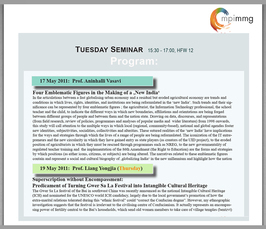"Superscription without Encompassment: Predicament of Turning Gwer Sa La Festival into Intangible Cultural Heritage"
Tuesday Seminar Spring/Summer 2011
- Datum: 19.05.2011
- Uhrzeit: 15:30 - 17:00
- Vortragender: Liang Yongjia
- Ort: MPI-MMG, Hermann-Föge-Weg 12, Göttingen
- Raum: Conference Room

For more details please contact vdvoffice(at)mmg.mpg.de.
The Gwer Sa La festival of the Bai in southwest China was recently announced as the national Intangible Cultural Heritage (ICH) and nominated for the UNESCO world ICH candidacy, largely due to the local government’s promotion of how the extra-marital relations tolerated during this “ethnic festival” could “correct the Confucian dogma”. However, my ethnographic
investigation suggests that the festival is irrelevant to the civilising centre of Confucianism. It actually represents an encompassing power of fertility central to the Bai’s households, which send old women members to take care of village temples (bentzvt) and “cultivate for the family”. During the festival, the Bai villagers connect to the power of fertility in the Shendu Temple that encompasses all other village temples, by “visiting” (gwer), “facing”(chaol), and engaging in extra-marital relations. Important to this fertility power of the Shendu Temple is its annual renewal achieved by the women cultivators in the villages who, prior to the festival, “receive” (ger) an ancient Bai princess in a temple exterior to the entire Bai region, a princess married to a stranger-king in an “unseemly” manner. The paper argues that the state’s effort to turn the Gwer Sa La festival into Intangible Cultural Heritage is “superscription without encompassment”, that is, the effort is based on a set of postcolonial discourses of ethnic identity and nationalism, but fails to encompass the locally-sanctioned morality and cosmology.